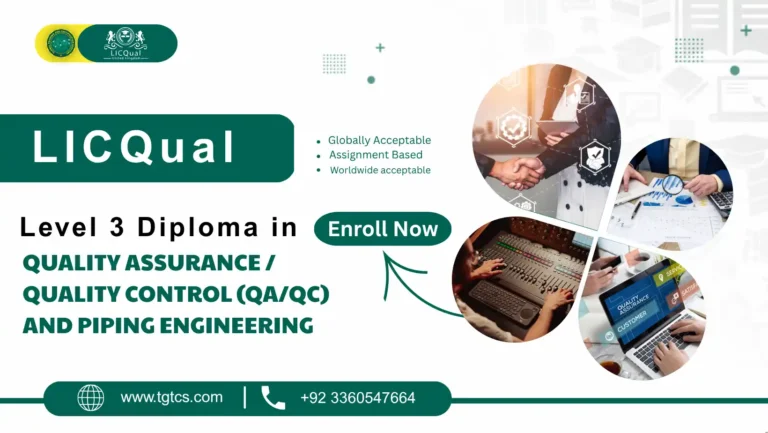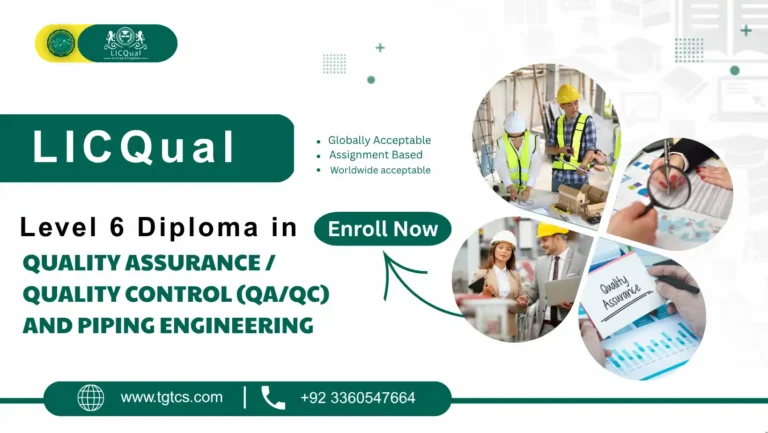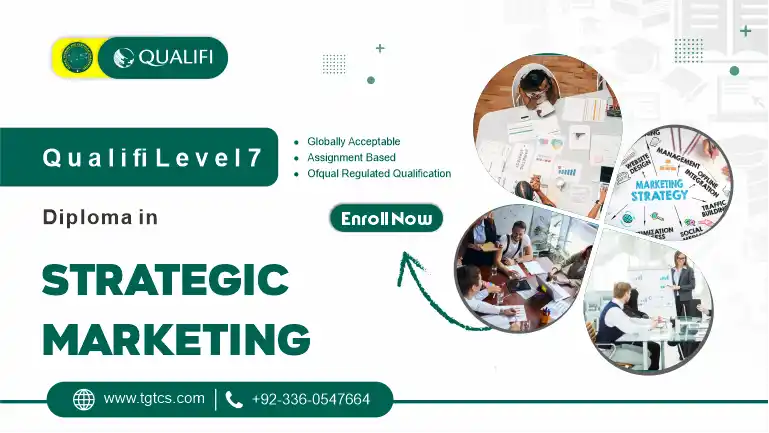ICTQual Level 3 Diploma in Environmental Engineering 60 Credits – 6 Months
The ICTQual Level 3 Diploma in Environmental Engineering is the perfect course for you. Designed for individuals eager to gain in-depth knowledge of environmental engineering principles, this 6-month program equips you with the necessary skills to thrive in this rapidly growing sector.
The ICTQual Level 3 Diploma in Environmental Engineering (60 Credits) is a comprehensive qualification aimed at individuals interested in the design, development, and implementation of environmental engineering solutions. This course focuses on the intersection of environmental science and engineering, providing students with a solid understanding of how to address environmental challenges using technical and sustainable solutions.
Enrolling in the ICTQual Level 3 Diploma in Environmental Engineering is straightforward. Simply visit the official website of the course provider to fill out the online application form. You will need to meet the entry requirements, which typically include a basic understanding of science and mathematics. However, if you’re unsure whether you meet the criteria, contact the course provider for guidance.
If you are looking for a career in environmental engineering, the ICTQual Level 3 Diploma in Environmental Engineering offers a perfect balance of academic learning and practical skills, all within a 6-month timeframe. By completing this accredited diploma, you’ll be well-positioned to take on roles in sustainable engineering, environmental management, and renewable energy sectors.
The Global Training and Certification Services (TGTCS) is Directly Approved Training Centre of ICTQual
The ICTQual Level 3 Diploma in Environmental Engineering (60 Credits) is a comprehensive 6-month course designed to provide students with the skills and knowledge needed to pursue a career in environmental engineering. This qualification covers key topics such as sustainable design, environmental management, water and wastewater treatment, climate change, and renewable energy.
With a flexible learning approach, the course is suitable for individuals looking to quickly enter or advance in the growing environmental engineering field. Upon completion, graduates can explore diverse career opportunities, including roles in sustainability consultancy, renewable energy, water management, and environmental compliance. The diploma is accredited and globally recognized, offering a solid foundation for those passionate about environmental issues and seeking a sustainable career path.
Mandatory Units
The Units of Level 3 Diploma in Environmental Engineering 60 Credits – 6 Months are as ;
- Fundamentals of Environmental Engineering
- Sustainable Development and Green Engineering
- Pollution Control and Resource Management
- Environmental Monitoring and Reporting
- Environmental Policy and Governance
- Advanced Topics in Environmental Engineering
Below are the learning outcomes for each study unit in the ICTQual Level 3 Diploma in Environmental Engineering program:
Unit 1: Fundamentals of Environmental Engineering
Upon completion of this unit, learners will be able to:
- Comprehend the core principles of environmental science and their significance in engineering.
- Describe the structure, function, and interconnectedness of ecosystems.
- Identify key environmental issues, including climate change, biodiversity loss, and resource depletion.
- Use foundational knowledge to evaluate environmental impacts and propose engineering solutions.
Unit 2: Sustainable Development and Green Engineering
Upon completion of this unit, learners will be able to:
- Define sustainable development and its significance in engineering practices.
- Identify and assess green engineering techniques to reduce environmental impact.
- Demonstrate understanding of renewable energy sources such as solar, wind, and bioenergy.
- Evaluate strategies for enhancing energy efficiency and resource conservation in engineering projects.
Unit 3: Pollution Control and Resource Management
Upon completion of this unit, learners will be able to:
- Explain the main types and sources of pollution affecting air, water, and soil.
- Evaluate methods to reduce and mitigate pollution across different environments.
- Assess resource management strategies and their role in sustainability.
- Understand waste minimization and recycling techniques.
Unit 4: Environmental Monitoring and Reporting
Upon completion of this unit, learners will be able to:
- Explain the principles of environmental monitoring and its significance.
- Identify tools and techniques used to measure air, water, and soil quality.
- Analyze the processes involved in environmental risk assessment.
- Interpret and document environmental data for decision-making and reporting purposes.
- Understand the role of Geographic Information Systems (GIS) in tracking environmental changes.
Unit 5: Environmental Policy and Governance
Upon completion of this unit, learners will be able to:
- Understand global environmental laws and treaties.
- Explain the role of national and international regulatory frameworks in environmental protection.
- Evaluate the contributions of governments, NGOs, and businesses to environmental governance.
- Analyze policies designed to combat climate change and promote sustainability.
- Examine the ethical and social implications of environmental policies.
Unit 6: Advanced Topics in Environmental Engineering
Upon completion of this unit, learners will be able to:
- Explore emerging technologies in environmental engineering.
- Explain advancements in water treatment, air purification, and renewable energy systems.
- Analyze sustainable approaches to urban planning and infrastructure development.
- Assess engineering solutions to address global environmental challenges.
- Understand the application of advanced techniques in solving complex environmental issues.
The ICTQual Level 3 Diploma in Environmental Engineering (60 Credits – 6 Months) offers a range of benefits to learners, providing them with the skills and knowledge needed to make a meaningful impact in the field of environmental engineering. Here are the key benefits of completing this course:
1. Comprehensive Knowledge of Environmental Engineering
This diploma provides in-depth coverage of fundamental and advanced topics in environmental engineering, equipping learners with a solid foundation in areas such as pollution control, resource management, sustainable development, and environmental monitoring.
2. Practical Application of Environmental Solutions
Learners will gain practical insights into applying engineering techniques to address real-world environmental challenges, such as climate change, biodiversity loss, and resource depletion, enabling them to contribute effectively to sustainability efforts.
3. Expertise in Green Engineering and Sustainability
The course emphasizes green engineering practices and sustainable development, ensuring that graduates are well-versed in the latest environmentally-friendly technologies and approaches, such as renewable energy systems, energy efficiency, and waste minimization.
4. Industry-Relevant Skills
By covering topics such as pollution control, environmental monitoring, and the role of environmental policies, this diploma prepares students with the skills necessary to work in various sectors, including government, private industry, and NGOs, focusing on environmental protection and sustainability.
5. Career Advancement Opportunities
With a Level 3 diploma, graduates will have the skills and qualifications to pursue careers in environmental engineering, environmental consultancy, urban planning, sustainability management, and more. This course opens doors to both entry-level and advanced positions within the growing green sector.
6. Short Duration and Flexibility
The 6-month duration of the course allows learners to quickly gain the expertise required to advance in their careers, while the flexible learning approach enables them to study at their own pace.
7. Focus on Emerging Technologies
The course covers the latest innovations in environmental engineering, such as advancements in renewable energy, water treatment, air purification, and sustainable urban development, ensuring that learners are equipped with cutting-edge knowledge in the field.
8. Preparation for Further Education
Upon completion, learners will be prepared to pursue further studies in environmental engineering or related fields, gaining additional qualifications or advancing into higher-level roles in environmental management or policy.
9. Development of Critical Thinking and Problem-Solving Skills
The diploma program encourages students to think critically and develop problem-solving abilities, essential for tackling complex environmental challenges and designing effective engineering solutions.
10. Global Relevance
The course covers global environmental issues and policies, making it suitable for students who wish to work in international environmental projects, offering insights into global environmental laws, treaties, and governance frameworks.
By completing the ICTQual Level 3 Diploma in Environmental Engineering, learners will be equipped with both the theoretical knowledge and practical skills required to thrive in the rapidly evolving field of environmental engineering.
The ICTQual Level 3 Diploma in Environmental Engineering is ideal for individuals who are passionate about environmental sustainability and want to pursue a career in the growing field of environmental engineering. The ideal learner for this course would possess the following characteristics:
1. Interest in Environmental Issues
The ideal learner is someone who is deeply concerned about global environmental challenges such as climate change, pollution, resource depletion, and biodiversity loss, and seeks to make a tangible difference in addressing these issues through engineering solutions.
2. Aspiring Environmental Engineers
This course is well-suited for individuals aiming to build a career in environmental engineering, whether in the public or private sector, and who are interested in working on projects related to sustainability, pollution control, resource management, and green technologies.
3. Recent Graduates or School Leavers
Individuals who have completed secondary education or have recently graduated from a related field, such as science, engineering, or technology, and wish to specialize in environmental engineering would benefit from the foundational and advanced knowledge provided by this diploma.
4. Professionals Seeking Career Advancement
Existing professionals in fields like civil engineering, environmental science, or resource management, who want to specialize in environmental engineering or move into more advanced roles in sustainability and environmental protection, will find this course an excellent way to enhance their skills and qualifications.
5. Problem-Solvers and Critical Thinkers
The ideal learner should have strong analytical and problem-solving skills, as the course requires the ability to assess complex environmental challenges and devise practical, engineering-based solutions. Critical thinking is key to understanding environmental impacts and finding effective, sustainable solutions.
6. Self-Motivated and Committed Learners
Given the course’s compact six-month duration, the ideal learner should be self-motivated, able to manage their time effectively, and dedicated to completing the program within the set timeframe.
7. Learners Interested in Green Technologies and Sustainability
Those who have a strong interest in renewable energy, green engineering practices, energy efficiency, and sustainable urban planning will find the course content highly relevant to their career aspirations and interests.
8. Global Perspective
This course is also suited for individuals interested in global environmental issues, as it includes content on international environmental policies, laws, and treaties. Ideal learners will be motivated to work on projects that have a worldwide impact, whether locally or internationally.
9. Technology Enthusiasts
Learners who have an interest in technological advancements and innovations, particularly in areas like renewable energy, water treatment, air purification, and GIS for environmental monitoring, will benefit from the advanced topics covered in the course.
10. Ethically-Conscious Individuals
The ideal learner is someone who is not only interested in engineering but also deeply aware of the ethical and social implications of environmental decisions and policies, and is committed to making sustainable choices in their professional practice.
This course is perfect for those looking to make a meaningful contribution to environmental protection and sustainability, offering a pathway to a rewarding career in environmental engineering.
Progression Routes
The ICTQual Level 3 Diploma in Environmental Engineering provides learners with essential knowledge and skills, laying a strong foundation for a range of academic and professional opportunities. Upon successful completion of this 6-month program, graduates can pursue various paths for further education and career advancement.
Academic Progression
Graduates of this diploma can advance their studies to enhance their expertise. Potential academic pathways include:
- Level 4 or 5 Diploma in Environmental Engineering or Related Fields: Deepen your knowledge with more advanced courses in environmental science and engineering.
- Undergraduate Degree Programs: Leverage your credits and foundational knowledge to enter Bachelor’s programs in Environmental Engineering, Environmental Science, Sustainability Management, or similar fields.
- Specialized Certifications: Pursue certifications in specialized areas such as renewable energy, pollution control, or environmental management to broaden your expertise.
Career Opportunities
The diploma equips graduates with the skills required for entry-level roles in the environmental engineering sector. Possible career paths include:
- Environmental Technician: Assist engineering teams in implementing sustainable and environmentally-friendly solutions.
- Pollution Control Assistant: Monitor and manage pollution levels in industrial or urban environments.
- Sustainability Coordinator: Help organizations achieve their sustainability objectives and reduce environmental impact.
- Waste Management Officer: Develop and manage efficient waste disposal and recycling systems.
- Renewable Energy Assistant: Support projects related to solar, wind, or bioenergy systems.
Professional Development
Graduates can further enhance their careers by joining professional organizations and expanding their networks. Opportunities for professional development include:
- Membership in Environmental or Engineering Associations: Connect with industry peers and access professional resources.
- Participation in Conferences, Seminars, and Workshops: Stay informed about the latest trends and innovations in environmental engineering.
- Internships and Apprenticeships: Gain practical experience through internships or apprenticeships with leading environmental firms or organizations.
The ICTQual Level 3 Diploma in Environmental Engineering serves as a gateway to rewarding career opportunities and continued educational growth in the rapidly-evolving field of environmental engineering.
Course Overview
Course Level
Level 3
Course Units
06 Mandatory Units
Duration
6 Months






